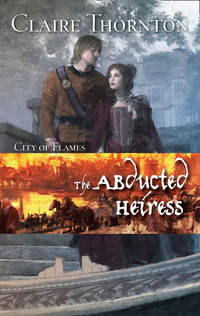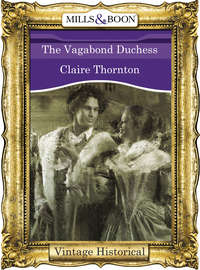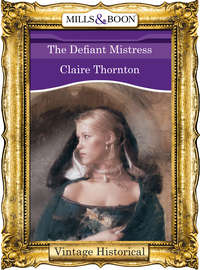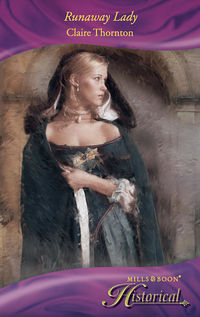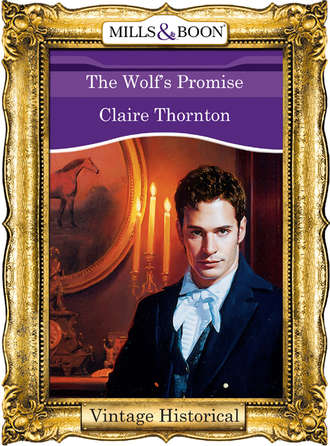
Полная версия
The Wolf's Promise

‘This time there’s no doubt your eyes are open. Remember that when you next accuse me of not being a gentleman.’
‘I don’t…’
Benoît’s mouth covered her parted lips and stifled whatever it was she had been going to say. Shock held her rigid for several seconds. She had never been kissed like this before, and nothing in her previous experience had prepared her for dealing with such a situation.
The wind wrapped her skirts around them, locking them together. She could feel the heat of his body burning through her clothes. He was holding her firmly in his arms. She was acutely aware of the power in his lean, hard-muscled body, but his lips were gentle and persuasive on hers. Her heart was racing; strange exotic warmth slowly filled her veins. Her empty hands opened once or twice in vague uncertainty, then, almost of their own volition, they slid up the ridged black cloth of his sleeves to rest on his shoulders.
Dear Reader
The location of this story is particularly special to me. The book is set in West Sussex, on the English coast, the countryside where I was born and grew up, and where my family roots go deep. My father has lived all his life on the same country road—moving only half a mile from his birthplace when he married—and it’s a family legend that my mother’s forebears were involved in the Sussex smuggling trade. I was a shy little girl, and I was entranced by the idea that I might be distantly related to the daring, romantic adventurers of the past. But when I grew older, and did some real research on the ‘Gentlemen’, I found they weren’t always as noble and heroic as I’d pictured them. That left me with a dilemma. I’d always wanted to write a book featuring smugglers—but should I make them the good guys or the bad guys…?
I hope you enjoy this chance to discover my solution to that dilemma as much as I enjoyed writing it.
Best wishes
Claire Thornton
The Wolf’s Promise
Claire Thornton

www.millsandboon.co.uk
CLAIRE THORNTON
grew up in Sussex, England, and studied history at York University. She loves writing about the romantic and noble heroes of earlier ages. Claire has also written under the name of Alice Thornton.
Contents
Prologue
Chapter One
Chapter Two
Chapter Three
Chapter Four
Chapter Five
Chapter Six
Chapter Seven
Chapter Eight
Chapter Nine
Epilogue
Prologue
West Sussex 1793
I t was cold and dark on the beach. A black night sky arched over the endless expanse of sand and gusts of icy wind buffeted the Earl. He shivered and turned up the collar of his greatcoat. He could hear the crash of the incoming tide away to his right, but he couldn’t see much further than the circle of light thrown by the lantern Sir William had snatched from the riding officer.
‘Damn it! The scurvy villain lied to me!’ Sir William exploded.
He was staring at the marks in the ridged, damp sand where the kegs had been hauled up onto the beach in a long daisy-chain of contraband.
‘Or perhaps your informant was himself misled?’ the Earl of Ellewood suggested, stamping his feet to keep warm.
It was quite clear what had happened. The smugglers’ landing had been here, while Sir William’s small party had been lying in wait on an empty beach two miles to the west.
‘They’re a cunning lot,’ the riding officer began nervously. It made him anxious to have the local magistrate, two of the magistrate’s men and a visiting earl assisting him in his duty. ‘It would be just like them to feed you false…’
‘Be quiet, damn you!’ Sir William growled. ‘If you were any good at your job, neither the Earl nor I would be wasting our time on this godforsaken beach! Well, their tracks are clear enough. We’ll follow them. Lead the way.’
He handed the lantern back to the riding officer and swung himself into his saddle.
‘Yes, sir.’ The riding officer shuttered his lantern until only a thin beam of light was visible. Then he climbed up onto to his horse and bent low in the saddle so that he could still see the smugglers’ tracks. His lack of enthusiasm was very evident.
Sir William and his men followed the luckless riding officer, but Lord Ellewood did not immediately join them. He was frowning in the darkness.
‘I think Bess has picked up a stone,’ he called. ‘I’ll catch up with you in a minute.’
‘As you wish.’ Sir William’s voice drifted back in the darkness. ‘Damn sorry about this, Henry. I was hoping to show you some action tonight.’
‘The night’s still young,’ the Earl replied.
He watched for a few seconds as the others rode away. Then he looked down at the dark, stirred-up sand and pinched his lower lip thoughtfully. The tide was coming in quickly; many of the smugglers’ marks had already been washed away, but he was sure he’d seen the deep footprints of heavily laden men and horses going down towards the water—not away from it.
There was probably a reasonable explanation for that, and he knew so little about the smuggler’s craft that he wasn’t inclined to make a fool of himself by voicing his observations.
But it was certainly a fact that Sir William had been tricked into waiting on a beach two miles to the west, yet the very obvious tracks leading away from the landing point also headed in a westerly direction.
Lord Ellewood began to lead his mare east along the beach, keeping close to the tideline. There was no moon in the dark sky. It was hard to see what lay ahead, but the stars provided some light, and now that he was away from the riding officer’s lantern the Earl’s eyes adjusted to the darkness.
Two hundred yards along the beach he found what he was looking for. A track of damp, churned-up sand leading inland from the sea. Horses and men had passed this way not long ago.
He felt a surge of gratified pleasure that he had guessed right, and his heart began to beat faster with excitement. There was no time to go back for Sir William. Without hesitation he followed the tracks up the beach towards the black shadows of the dunes.
The sea rumbled behind him; dried seaweed crackled beneath his salt-caked boots, and ahead of him he could hear the wind whistling through the thin, exposed grasses of the dunes—but he could barely see where he was going and he trod almost blindly towards his goal.
He was nearly among the dunes when the light of a lantern blazed suddenly in his eyes.
His heart thudded in startled alarm. He flung up a protective arm to his face, squinting into the glaring light and black darkness ahead, unable to see how many people confronted him. He had heard nothing to warn him of their presence.
He struggled to see beyond the lantern light, remembering all the stories Sir William had told him of smugglers beating or even killing anyone they believed to be a danger to them. Was he going to be battered to death without even seeing his attackers?
‘I’m sorry, my lord,’ said an apologetic voice, ‘but I’m afraid I can’t let you go any further.’
‘What the hell do you think you’re doing?’ the Earl rasped, more angry than frightened. ‘Who are you?’
He heard someone chuckle in the darkness behind the lantern.
‘No one important.’ The voice sounded like that of a young man—pleasant, educated and confident. ‘In case you can’t see it, my lord, I should warn you that there is a pistol levelled at your heart. It will be better for both of us if you don’t make any sudden moves.’
‘You damn murderer! You’ll swing for this!’ Lord Ellewood grated furiously.
‘I haven’t murdered anyone yet,’ his opponent pointed out mildly. ‘I would infinitely prefer it to remain that way—but the matter lies in your hands.’
The Earl’s first moment of surprise and fear had passed and he began to relax. As far as he could tell, the other man was alone, and he didn’t seem to have any immediate plans for violence.
‘What do you intend to do with me?’ he asked more temperately.
‘Nothing,’ said the young man. ‘We could discuss the weather—it’s remarkably dry for the time of year, don’t you think? Or you could tell me the latest scandals from London—and when the conversation begins to pall, you will be free to go back to the Manor.’
‘What if Sir William catches up with us first?’ the Earl enquired politely.
His eyes were beginning to adjust to the lantern light which was not, in fact, all that bright, and he could discern the dim outline of his waylayer. The young man was bare-headed in the wind. He was also tall, but he seemed to be lightly built and Lord Ellewood felt confident that, if an opportunity arose, he would be able to turn the tables on his opponent.
‘He won’t,’ said the young man confidently.
‘What have you done to him?’ the Earl demanded angrily, taking a hasty, unconsidered step forward as he spoke, suddenly afraid for his friend.
‘Stand still!’ Unexpected menace in the assured voice brought the Earl to an abrupt halt. ‘Thank you. I believe I’ve already mentioned I’m not partial to murder.’ After his initial sharpness, the young man sounded friendly again, and almost reassuring. ‘But I’ve no doubt Sir William will find tonight’s chase more exhilarating than the average foxhunt.’
The Earl drew in a deep breath, allowing the sudden tension to ease from his body.
‘You’ve sent him on a wild-goose chase?’ he said at last.
‘As you say,’ the youth agreed. ‘Until your arrival I thought I’d lost the toss, but now I see I was mistaken,’ he added politely.
The Earl grunted, unimpressed by the implied compliment.
‘I’m sorry to detain you in such an inhospitable place, my lord,’ said the young man apologetically. ‘If you had gone with Sir William you would have been a great deal warmer! But I won’t keep you much longer. If you wish, you can retrace your steps now.’
‘That’s hardly more enticing than my current situation!’ Lord Ellewood retorted.
The young man laughed.
‘I don’t suppose it is,’ he admitted. ‘Allow me to make some amends.’
He put the lantern down, balancing it carefully between two tufts of grass halfway up a dune. The Earl’s eyes narrowed speculatively, wondering if this would be a good moment to spring at his companion—but the pistol continued to point steadily at his heart. The young man was both watchful and cautious. It seemed increasingly unlikely that he would make a mistake.
He delved in his pocket with his free hand.
‘Catch!’ he said, and tossed something to the Earl.
Lord Ellewood barely had time to react. He fumbled the catch and nearly dropped the flask.
‘Brandy?’ he asked dryly, unscrewing it.
‘What else? I’m not particularly fond of it myself, but it might compensate for the bitter wind around your ears,’ the young man replied. ‘You’ve had an unrewarding night, my lord.’
‘I’m not so sure.’ The Earl swallowed a mouthful of fiery spirit. ‘At least I can claim to have bandied words with a smuggler…’
‘Free trader,’ the young man corrected him pleasantly. ‘Sir William bandies words with us all the time—but not usually in circumstances of much benefit to him.’
A sudden gust of wind blew up a swirl of dry, gritty sand from the dunes. The mare snorted and reared backwards, lunging away into the darkness.
Startled, the young man turned his head—and the Earl seized the brief opportunity. He leapt towards the smuggler, knocking him to the ground without difficulty.
The pistol fired, but the Earl had already thrust it to one side. He was heavier than his opponent, and he’d had the element of surprise in his attack. He had no doubt that the youth had pulled the trigger involuntarily as he fell backwards.
They struggled among the dunes in an untidy confusion of flailing limbs. It was far too dark to see his opponent and Lord Ellewood fought by instinct, trying to subdue the youth without inflicting real damage. But the young man was strong, and agile as an eel. He twisted and broke free with a powerful lunge, disappearing among the shadows of the dunes.
The Earl sprang to his feet, drawing his sword instinctively as he glanced around, alert to any indication he was about to be attacked from the darkness.
The lantern was still resting undisturbed between the tufts of grass, sending its pale beam of light towards the sea. The wind hissed through the dunes, but the Earl could hear no other movement from the shadows surrounding him.
The mare had bolted, frightened by the pistol shot and the noise of the fight.
The Earl backed away, his boots crunching on the shingle as he returned to the firm sand of the seashore. He wasn’t a coward, but he had no desire to run onto an unseen blade among the dunes.
Then a dark shape rose silently from the shadows, sword in hand, and sprang towards him.
It was an untidy fight, illuminated only by the distant stars and the inadequate lantern. Twelve years earlier the Earl had served in the America Wars. He had both training and experience on his side, but his opponent was familiar with the ground and very, very fast.
Even so, the young man was soon outmatched. There was a sickening slither of steel, his sword was wrenched from his hand, and he found himself flat on his back in the sand.
‘Now I’ll see you!’ the Earl growled, his blade at his defeated opponent’s throat. ‘Get up! But be warned—if you make one false move I’ll run you through!’
The young man got to his feet displaying neither fear nor panic. He was breathing quickly from his exertions, but otherwise he was as much in control of himself now as he had ever been. The Earl smiled grimly in the darkness, aware of a certain measure of respect for his opponent. Smuggler or not, the youth had fought bravely and bore himself well in defeat.
‘I must take a few more lessons before I cross swords with you again, my lord,’ he said boldly.
‘You’ll not have the opportunity.’
The Earl picked up the lantern and shone it straight into the young man’s face.
The youth had been expecting it, and he neither flinched away nor threw up a hand to protect himself from the light. The tip of Lord Ellewood’s sword was still grazing his throat, but his dark brown eyes stared fearlessly at the Earl from a lean, intelligent and extremely youthful face.
‘How old are you?’ the Earl demanded sharply.
‘Fourteen,’ said the boy.
‘My God!’
From his opponent’s composure and self-confidence Lord Ellewood had assumed the youth to be a good deal older.
They stared at each other in silence for several tense moments, then the boy grinned impudently.
‘Take care, my lord,’ he said, glancing at the lantern the Earl was holding. ‘It’s an offence to show a light so close to the sea. If Sir William catches you, he may be obliged to clap you in irons.’
‘You should be flogged at the cart’s tail for your insolence!’ the Earl growled, half angry, half amused by the boy’s disrespectful boldness.
‘Or hung in a gibbet until my dry bones fall through the iron cage as a warning to others?’ the boy suggested softly.
‘No!’ Lord Ellewood exclaimed, startled.
He paused, considering the implications of the boy’s comment. The lad’s connection with the smugglers might be difficult to prove, but there was no doubt that he had waylaid—and attacked—the Earl; for that charge alone he could expect a heavy penalty if he ever stood in the dock. His youth would offer little protection.
‘Do you intend to be a smuggler all your life?’ Lord Ellewood demanded abruptly. ‘Or was this escapade just a moment of brief, high-spirited folly?’
‘No.’ The boy held the Earl’s gaze for a few more seconds without attempting to clarify his ambiguous answer, then he turned away to look towards the sea, unheeding of the sword still held at his throat.
The first grey light of dawn was rising in the east and Lord Ellewood no longer needed the lantern to distinguish the boy’s features. The youth was almost as tall as the Earl, and his black hair was wildly tousled by the cold, salty air—but his eyes looked steadily towards the distant, silvery horizon, almost as if he saw his future there.
Lord Ellewood smiled sardonically. Despite the threatening sword, his prisoner had obviously decided that the risk of being precipitously dispatched was minimal—but the Earl wasn’t quite ready to confirm that assumption.
‘Stand still!’ he said harshly, thrusting the sword tip a little closer to the boy’s neck. ‘Don’t give me an excuse to save the hangman work.’
‘I am unarmed and at your mercy,’ the boy pointed out calmly. ‘I’m sure no man whom Sir William calls friend would take advantage of such a situation. What do you intend to do with me?’ he added matter-of-factly.
‘Damned if I know,’ the Earl admitted frankly, although his sword didn’t waver. ‘You’re too good for gallow’s meat. Perhaps I ought to have you pressed. A few years of naval discipline might make a man of you!’
‘A very courteous offer, but I have other plans,’ the boy replied instantly.
‘I daresay you have,’ said the Earl dryly, ‘but you should have thought of that before you held a pistol on me. You have the voice and manners of a gentleman, boy. News of this night’s escapade might seriously damage your family’s reputation and standing—don’t you think?’
There was silence for several long moments. The boy’s eyes were still fixed on the horizon and he did not look at the Earl. Lord Ellewood almost began to wonder if the youth had heard what he’d said. Then the boy replied,
‘Yes, my lord.’
The Earl grunted and sheathed his sword. The boy turned his head sharply at the sound. For an instant he seemed poised for flight—but he didn’t run; and there was a question in his eyes as he met Lord Ellewood’s gaze.
‘Which is the quickest way back to the Manor?’ the Earl asked, without attempting to explain his actions.
The boy stared at him for a few moments, a frown in his dark eyes as he tried to decipher the Earl’s intentions. Then he bent to pick up his own sword.
‘I’ll show you,’ he said. ‘We’ll go along the beach. It’s quicker and more comfortable for walking.’
‘An important consideration, since I am now on foot,’ Lord Ellewood agreed caustically. ‘I suppose you don’t have a horse hidden among the dunes?’
‘I regret not, my lord,’ the boy apologised.
‘I imagine you must be well known to Sir William,’ said the Earl, as they began to walk along the beach.
‘We have met,’ said the boy cautiously.
‘Hmm.’ Lord Ellewood turned over several possible ways of dealing with his erstwhile prisoner as they strode, almost companionably, along the damp sands.
‘Why didn’t you run when you had the chance?’ he asked abruptly. ‘You must know I couldn’t catch you in the dunes.’
‘You’ve seen my face,’ said the boy simply. ‘I’d like to know what you intend to do next. As you just implied, Sir William would certainly recognise my description.’
‘I see,’ said the Earl dryly. ‘I dare say you could be long gone before he came in search of you.’
‘But my family couldn’t—as you also pointed out—and my father’s practice would suffer. Inflict your punishment on me, my lord, whatever it is—but not on them.’
The boy turned as he spoke and looked squarely into the Earl’s face. The force of his personality was reflected in his keen, dark eyes. Lord Ellewood was powerfully struck by the coiled spring of potential within the youth.
For a moment it seemed as if they were well matched: the shrewd-eyed, experienced man and the fearless, black-haired boy. They had more in common than the Earl would willingly choose to admit.
‘I’ll not betray your secret,’ he said curtly. ‘But I suggest you find more legitimate outlets for your ambition in future. The gibbet is a sorry place for anyone to end their days.’
‘Thank you.’ The boy spoke without overemphasis, but the Earl caught the undercurrent of sincerity in the light voice.
‘That way, my lord,’ he said, turning to point inland. ‘Follow the track for half a mile. Then turn right onto the lane. Turn left at the crossroads and Sir William’s house is a mile farther up on the right.’
‘Thank you,’ said the Earl.
He hesitated, suddenly reluctant to part from his companion. He was extremely curious about the boy but, in the circumstances, it probably wasn’t advisable to try to pursue their acquaintance.
‘My name is Benoît Faulkener, my lord,’ said the boy, clearly and unhurriedly, surprising the Earl once again.
‘Very French,’ Lord Ellewood replied casually, not quite sure why the boy was sharing this information with him. ‘I’d heard that most of the smugglers have contacts across the Channel.’
‘My mother’s French,’ said Benoît. ‘My father is the doctor in Arundel. My friends call me Ben. It seems unlikely that you will ever be my friend, my lord, or that you will ever need my services. But, if you do, I’ll not forget what I owe you.’
The Earl stared at him in undisguised astonishment as he realised the implications of the boy’s words.
‘You’re offering to repay me for my silence?’ he exclaimed.
‘At any time, and in any way you choose, my lord.’ Benoît stepped back and bowed with something of a flourish.
The Earl laughed disbelievingly.
‘Your effrontery is extraordinary!’ he declared, unable to imagine any circumstances in which he might need the boy’s help. ‘Take care that one day you don’t overreach yourself.’
Benoît grinned, the fresh dawn sunlight emphasising the distinctive contours of his dark face and the gleam of his strong white teeth as he returned the Earl’s gaze.
‘That may happen, but I’d rather try, and fail—than live knowing I’d never had the courage to try at all!’ he declared boldly. ‘Good day, my lord.’
He turned and strode away across the open fields which fronted the beach, leaving the Earl alone on the cold, windswept sands.
Chapter One
Early March 1809
T he pale winter’s day was nearly over when Lady Angelica Lennard arrived at Holly House. She had been anxiously anticipating this moment for hours, but now she was here she was almost reluctant to climb down from the carriage.
‘I’ll knock on the door, my lady,’ said her coachman.
‘Thank you.’
As she waited for the door to open, Angelica glanced quickly around. It was too dark for her to see much, but she was acutely aware of how isolated the house was. It was situated a few miles south-west of Arundel, on the flat, windswept coastal plain of West Sussex. There wasn’t another house within half a mile. It was an ideal place for a master smuggler to set up his headquarters.
Angelica suppressed a shiver. She was used to the teeming bustle of London and, even without the possibility that she was walking into a smuggler’s lair, she would have found the absence of visible human life disturbing. There was not even a light showing from one of the windows to suggest the house was occupied.
It wasn’t raining but there were heavy clouds in the sky, and an icy wind wrapped her skirts around her legs and tugged at her bonnet. She did her best to ignore the discomforts of the weather. She was conscious of her maid’s dour presence beside her. Martha had made no secret of her disapproval of this errand. Angelica was equally determined not to reveal her own misgivings.
The front door opened and a maidservant looked cautiously out into the gloom, lit from behind by a pale light in the hallway. Angelica summoned up her courage and stepped briskly forward.


